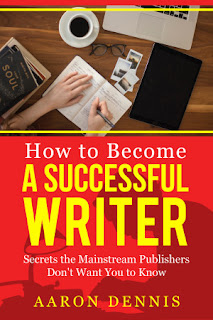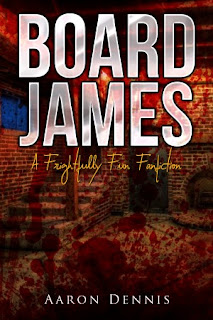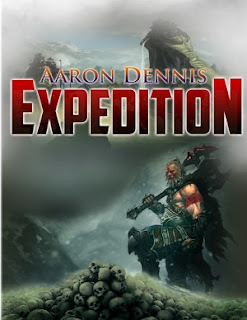The Only Path to Failure Is Never Trying:
a guest post by Aaron Dennis
2018 has come and gone. Your hopes,
dreams, goals, and aspirations are alive and kicking. You’re here, now, reading
this article because you are a writer. You are either meeting your goals, or
setting them, and like any other task, it’s imperative you know how those who
have come before you have progressed.
You need to know how to write, how
to edit, and eventually how to publish; what you want to do is start your
career off on the right foot. Maybe you have already begun your writing career,
and things aren’t going so great, or maybe, things are going well, but they
could go better. It doesn’t matter at what stage your career is at the moment,
there is always more to learn. Things can be done more effectively,
efficiently, creatively, but let’s take a step back.
 |
| Suzy Hazelwood, pexels.com |
You are a writer. Even if you have
yet to put down the first word of your story, you are a writer because you have
a story to tell, and jotting down your ideas is the first step in writing, but
not necessarily the first step to becoming a successful, wage earning writer.
What, then, is the first step?
Well, let me tell you a story.
I tried becoming a writer for the
first time about eighteen years ago. Back then this kind of information was not
so readily available. It was not possible to Google “writing” or “publishing”
and find innumerable blogs or articles. Hopping on Wikipedia or WikiHow to get
a feel for the process was also impossible. It was impossible to open your
browser, and research your material for a sense of authenticity; it took a
great deal of effort to do more than just type on your word program, but that
was all I had.
I started placing my thoughts down
just the same as most of you have done or are about to do, and then, about
three pages into my story, I didn’t know what I wanted to do. I didn’t know the
next part of my story. Truthfully, I didn’t really care all that much either,
and I didn’t know that Reader’s Digest existed. I’m still not sure if Writer’s
Digest existed, and I certainly didn’t have the faintest clue on how to publish
my work once it was written, so I just gave up.
Don’t you do the same.
 |
| Pixabay, pexels.com |
Years went by. Sites like Wattpad,
Quotev, and Smashwords
erupted onto the scene, but I’m an impulsive individual, and I don’t always
take the time to look before I leap. Nevertheless, one day, out of the blue,
back in April of 2011, I had such an idea for a story that I had to write it
down. I didn’t even have the intention of publishing. I was just writing
because I wanted to, and that’s a great start for any hobby, but hobbies are
just hobbies, and we enjoy them for the sake of enriching our own lives.
I wrote my little short story, and
with its completion I had the confidence and drive to try another, and then
another. I showed them to my friends and family, claiming I had found them
online somewhere and just thought they were neat. My friends and family thought
they were okay, but I thought they were the gazelle’s bells, and I could not
understand how these people didn’t feel the same.
I didn’t know what a target
audience was. I didn’t know the difference between writing a chronological
series of events and a story worth reading, but I knew I had something, so I
set my ego aside, and read through my work.
In reading my stories, I came
across some passages that were confusing. I had no longer been thinking through
those stories the way I was when I was writing them, and I needed to clarify my
own statements, my own scenes, and then it dawned on me that people who read
stories don’t have the option of clarifying meaning because they cannot speak
to the writer.
 |
| Mikechie Esparagoza, pexels.com |
Think about that for just a second.
When you speak to your children, friends, siblings, there are times when they
don’t understand you, or you them, and so you ask questions and compare
experiences in order to clarify information, but your audience can’t do that
with you, so when you write for an audience, you have to keep them in mind, but
that shouldn’t interfere with your writing process.
While you’re writing your story,
you need to write it for you, but when you proof your story, you should be
making changes for your target audience. I made those changes for each of my
stories, and then I showed them to other friends, and one of my friends really
enjoyed one of my stories and told me I should try to get it published. I
thought that was a pretty cool idea, so I did what anyone would do; I Googled
“how to publish a story”, and naturally, I came across a bunch of POD (print-on-demand) sites
like Xlibris.
I went through their site, sent my
submission, and when I got that call to publish my work, man, was I pumped. I
thought I had hit it big. I knew my stories were going to be in every
bookstore, and I was going to earn millions of dollars because, I mean, how
many people have actually written a whole story?
Well, tons of people, but I
digress.
If you’re not familiar with POD
companies, I’ll tell you that they can either be a surefire way to begin your
lucrative, writing career, or they can be your bane. They were my bane. POD companies sell a service,
and they don’t give a crap about your story; they only care that you will
purchase their services. I gave them close to ten thousand dollars, and my
story was published, and I earned about seventy five dollars, and every review
I got was a one star review denigrating my drivel.
They were right to eviscerate me.
What I was peddling was barely more than a first draft, but how was I to know?
I didn’t comprehend the importance of editing. I didn’t know what editing was,
and I didn’t know I could hire an editor, or what a good editor can provide
versus a charlatan.
If you’re like most writers, and
this happened to you, you’ve done one of two things; you’ve either chosen to
believe that you are misunderstood, and those reviewers don’t know what they’re
talking about, or you decided to abandon your ego and consider that once you’ve
published your work and are charging people for it, you are writing for
consumers, reader, and what they think is
paramount.
Write for yourself. Publish for
your audience.
 |
| James Tarbotton, Unsplash |
So what did I do? I pulled my book
from Xlibris, and wrote another book. Upon completing my new novel, I decided
to approach major publishing houses. Their job is to sell books to readers, so
they polish those stories by employing teams of editors who can rewrite your
story for a target audience, and that was what I wanted—to just write and let a
company do everything else without my having to pay for services rendered, but
how does one publish through a mainstream publisher?
You have to query a literary agent.
Sure, you can try to submit your story directly, but it will end up in the
slush pile—a stack of papers on someone’s desk that never gets read—or you can
find an agent, but how do you find an agent, and how do you know if that agency
is a real agency or just a group of money suckers? You have to do a great deal
of research, and this is where Writer’s Digest comes into play; they have
verified agents that will help you…if your work is exceptional, but even that
might not be enough.
Before an agent accepts your
manuscript, you have to query, but that means learning how to write a proper
query. Then, if the query is good, they’ll take a look at your manuscript, but
if it isn’t professionally edited, or they think it isn’t “marketable”, they’ll
pass. I know all this because the first thing I did was submit my new novel to
a bunch of publishers, but you can’t, or you’re not supposed to, petition more
than one publisher at a time.
It usually takes between eight
months to a year for a publisher to notify you of whether or not they’ve
accepted your manuscript, if they notify you at all. Out of about a dozen
publishers, I received two notifications that what I wrote wasn’t what they were
looking for. The rest neglected to reply.
I queried agents, too, but they
were the same, so I decided to approach a smaller press, figuring that I could
work my way up. That’s a great way to build a successful, writing career, but
only if you sign with a true small press. Many of the smaller presses in
existence are actually hybrid presses, or crowdfunding agencies, or they just
want to publish ebooks, which are only available on their site, and that’s not
a good way to go.
Fortunately, or unfortunately, as
the case may be, I signed on with what I thought was a small press. I queried
the acquisitions editor, and she was kind enough to let me know that I was “dumping
too much info” in the beginning of my story.
What? Aren’t I supposed to let my
readers know what’s going on? Who the players are? What the setting is?
 |
| Irene63, Pixabay |
Well, yes, but not by dumping a ton
of info in the first five pages. The story should progress organically as an
experience for the reader, so I decided to go back through my whole book and
basically ended up rewriting that novel. Once I was satisfied, I resubmitted
and was picked up.
At that point, I was assaulted by
an enigmatic system of publishing. I had to come up with a cover, a blurb, and
a marketing plan. I’m not an artist. I don’t know what a good cover is supposed
to look like. I thought it was the publisher’s job to make my title appealing.
I didn’t know what a blurb was, so I just wrote a synopsis of the book. I
didn’t have a marketing plan, so I just said I was going to pay for advertising.
Since no one at the company
bothered to tell me I was an idiot, I thought I had done everything correctly.
Then came the editing process. I understand grammar and punctuation. I thought
that was what editing entailed, and since the editor made very few changes, I
once again thought I had nailed it. My book was flawless, and a real press was
publishing it, and there was going to be a paperback version, and certainly the
publisher wanted to make money, so I knew they were going to sell my book...and
I was going to make millions of dollars.
I published four titles with that
press and earned about ten dollars over the course of three years. I received
awful reviews claiming that the editing was horrible. Then, the press was
bought out by another company and my contracts were “lost in the transition.”
Since that was the case, and things had not gone as planned, I said that the rights
were mine, and I was going to go in a different direction.
By that time, I had learned of
Wattpad, Quotev, and Smashwords, and I had written and published copious short
stories. I purchased professional covers from a gentleman on Fiverr.com, and those covers have actually won some awards,
minor awards, but still, they’re all very snazzy. I also hired a few different
editors. Some were shysters, some were lazy, but one was Chuck Sambuchino,
a real editor I found through Writer’s Digest, and he was kind and professional
enough to teach me the finer points of editing; the art of transforming a dry
account of facts into a story with characters that feel and sound like real
people.
I had done so well for my self
writing short stories that I decided to publish all of my work on my own
through Smashwords, and pull my work from every other site. The beautiful thing
about Smashwords is that if you do have a flawless manuscript, and submit it
through their premium catalog, your book ends up on sites like Apple Books,
Barnes and Noble online, and practically everywhere else. You can also provide
print copies through Amazon KDP, and link those copies to your buy page on
Smashwords. They even work with an audiobook company called Findaway Voices, which employs professional voice artists,
who for a reasonable fee, can help you to produce phenomenal audiobooks.
One more great thing about
Smashwords is anybody can make a free account to either buy ebooks or download
free ebooks. With that account, readers can then sell their favorite books and
earn a percentage of the sale, so you can control how much your fans can earn
by simply reading, reviewing, and then blogging about your books.
This is how I make my living. I
don’t sell my books, not really. I sell a few dozen copies here and there every
week, but my fans who blog about my books, or perform readings of my books and
post those performances to YouTube, they sell my books to their friends,
families, and fans.
Selling a thousand copies of your
books is great. Having hundreds of fans is even better. Having your hundreds of
fans selling hundreds of copies of your books is the real goal.
 |
| Free-Photos, Pixabay |
Think about it. You read a book,
say, Harry Potter. You then talk to
your friends and family about Harry
Potter because people like discussing and sharing what they enjoy, so your
friends go out and buy Harry Potter
because you recommended it. Now, you can review and blog about Harry Potter, and people will buy Harry Potter because other people like Harry Potter. Certainly, you can set up
an affiliate link through some third party system and earn four cents every
time someone buys Harry Potter from
your blog, but you must realize that people will prefer to earn fifty cents, a
dollar, five dollars.
That’s the real goal. That’s the
layout.
 |
Suzy Hazelwood, pexels.com |
If you want to go through a
mainstream publisher, that’s your business, and you should do everything in
your power to accomplish that, but remember everything you need to do to get
there. While you’re doing that, why not publish a flawless book through
Smashwords, and entice your fans to earn money by selling your books? Of
course, if you have hundreds of people selling hundreds of copies of your
books, for what do you need a mainstream publisher? Movie rights? You can get
optioned through numerous websites like TaleFlick or
StoryPitches sometimes for free.
Here’s the deal. I spent six years,
from 2011 to 2017, spending money. Now, I earn money. I don’t have a day job.
I’m a writer. You can be one, too. In order to help everyone out, I outlined a
surefire strategy to help you accomplish just that. I also provide numerous
free resources, editing articles, marketing articles, and links to all the
people, sites, and companies you need in order to start your career off with a
bang.
For just 99 cents, you can get all the
information you need. Now, maybe, you’ve been where I’ve been, and you’ve made
my mistakes and learned from them. Maybe, you haven’t even begun to write, and
you don’t even know how to come up with an idea, but with this book, I promise
you will know exactly what to do and how best to do it.
 |
| https://www.smashwords.com/books/view/756737 |
This manual brings to your
fingertips all the practical knowledge required to build your long-term writing
career. Any writer of any level will benefit from the material within this
comprehensive guide. From the neophyte to the professional, anyone who reads
this book will learn everything from formulating an idea for a story, to
practicing the art of the short story, to writing proper fan fiction, and
writing an original novel.
This book not only teaches how to
write, but also how to market, edit, publish, and all with exercises and even
free resources. From start to finish, the ideas presented are done so in an
easy to understand and entertaining fashion. By the end of this manual, you
will not only know how to write, edit, publish, and market your book, but
you’ll know what kind of publishing is right for you.
Why don’t publishing companies want
you to know these secrets? Publishers run an exclusive good ole’ boys club, and
in doing so, they choose who they help to succeed, and who they help to fail,
but when you learn these secrets, you’ll know that no writer needs a publisher
in today’s internet age. Bypassing a publishing company not only allows you to
maintain control and earn the bulk of your income, but it relegates the old,
dinosaur, publishing companies to obscurity.
 |
bruce mars, pexels.com |
If you’re already successful,
that’s great. I’m truly very happy for you. Keep up the good work, but if
you’re not where you want to be, you have my promise that for just 99 cents you
will learn at least one thing that will help you make more money as a writer. A
one time purchase is worth you earning an extra hundred bucks a month.
It’s worth it to earn just an extra hundred bucks a year, so do yourself a
favor and at least take a peek at this book.
If you don’t want to buy it, that’s
totally cool. Like I mentioned, I have a plethora of free resources, too. All
you have to do is drop by www.storiesbydennis.com and click on the editing
services and free resources tab.
Thanks for reading. And thank you,
Marie, for allowing me the honor of this post. All of you have my support in
your writing endeavors. I sincerely wish you the best of luck in this
wonderful year of 2019.
Nice! Such a helpful article that shows just how harrowing the writing and publishing journey can be, and some tips to overcome the pitfalls...
A pleasure to have you on Writing in the Modern Age, Aaron!
Guest Blogger Bio
Nice! Such a helpful article that shows just how harrowing the writing and publishing journey can be, and some tips to overcome the pitfalls...
Nice! Such a helpful article that shows just how harrowing the writing and publishing journey can be, and some tips to overcome the pitfalls...
A pleasure to have you on Writing in the Modern Age, Aaron!
Guest Blogger Bio
Guest Blogger Bio
 I'm Aaron. I never know what to write for these bios. I
write, like, a lot.
I'm Aaron. I never know what to write for these bios. I
write, like, a lot.Just the same as every writer, there are stories I want to share with others. I have no influences. I write because I don't enjoy reading what other people have written.
I like Star Trek TNG, Hercules, the Legendary Journeys, and The Outer Limits. Maybe, my influences come from shows, which can explain my intense imagery.
If you'd like to read something different from everything you've ever read, try meowt!
You can find me at www.storiesbydennis.com
It's my central hub, and you can find all the links to connect with me there, but please, do connect with me on LinkedIn and GoodReads.
I don't follow back on Twitter, and I don't connect easily on Facebook.
Author Links:
Website: http://www.storiesbydennis.com
Smashwords: https://www.smashwords.com/profile/view/madpete1111Website: http://www.storiesbydennis.com
Goodreads: https://www.goodreads.com/author/show/5302182.Aaron_Dennis
Amazon Author Page (paperback versions): https://www.amazon.com/Aaron-Dennis/e/B009AUUAY2/
LinkedIn: https://www.linkedin.com/in/aaron-dennis-b3410540/
Aaron's Books:


























Thank you so much for allowing me this wonderful opportunity, and if there's ever anything I can do for you in return, do not hesitate to ask :)
ReplyDeleteGlad to have you here!
Delete